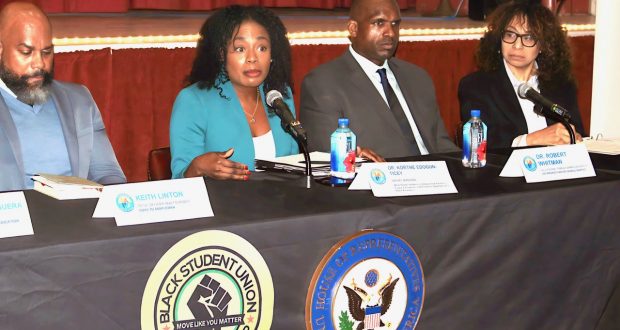By Lila Brown | California Black Media
On April 8, U.S. Congressmember Sydney Kamlager-Dove (D-CA-37) moderated a roundtable focused on Los Angeles Unified School District’s (LAUSD) strategies to improve Black student performance in classrooms.
Kamlager-Dove, who represents a district that covers parts of Los Angeles County, hopes that ideas shared at the event can be incorporated into models that can impact other regions across California, where Black students continue to fall behind their peers of other races and ethnicities.
Discussions at the event centered on LAUSD’s Black Student Achievement Plan (BSAP) and other educational initiatives aimed at enhancing learning and boosting test scores.
“The Black Student Achievement Plan is unique in that it takes a community-centered approach to uplifting Black students,” said Kamlager-Dove during the event held at John Muir Middle School in Los Angeles.
“We must implement culturally responsive education in the classroom to challenge our students academically while giving them a sense of purpose,” she continued.
In 2023, nearly 70% of Black children in California fell below a passing mark on the state standardized English Language Arts exam, and only about 20% of those students were performing at grade level based on their scores on the math assessment test.
A variety of public education experts joined Kamlager on the panel, including Dr. Kortne Edogun-Ticey, Senior Advisor, U.S. Department of Education; Dr. Robert Whitman, Educational Transformation Officer at LAUSD; Dr. Pedro Noguera, Professor and Dean at the University of Southern California Rossier School of Education; and Keith Linton, founder of the non-profit Boys to Gentlemen.
Jonathan McGee, a student who sits on the BSAP Student Advisory Council, also spoke during the panel.
Representatives from the office of Los Angeles Unified Board of Education Member Dr. George J. McKenna III, and Alberto M. Carvalho, Superintendent of LAUSD, also attended the event.
The BSAP was approved by the LAUSD Board of Education in February of the 2020-21 school year. Funds have been earmarked to address the longstanding disparities in educational outcomes between Black students and their non-Black peers. Dating back to the landmark case, Brown v. the Board of Education of Topeka, Kan., in which the U.S. Supreme Court declared that segregated schools were unconstitutional, positive outcomes for Black students continue to lag behind district and national averages for their non-Black counterparts.
Edogun-Ticey spoke about broader investments the federal government is making in education that directly impact Black students through The White House Initiative on Advancing Educational Equity, Excellence, and Economic Opportunity for Black Americans.
‘This administration did not shy away from the idea that we need resources for support which means billions of dollars in investment for HBCUs,” she explained.
“We know that about $2 billion for the Bipartisan Safer Communities Act (BSCA), but how many are aware of what those dollars do for student mental health,” Edogun-Ticey added.
In 2023, LAUSD expanded the BSAP Program by $26 million, demonstrating the district’s commitment to improving education for Black students, who are the lowest-performing subgroup of students in the state, only ahead of students with disabilities.
BSAP strategies include partnering with Black families and local community; supporting the implementation of culturally and linguistically responsive and anti-racist practices; offering wrap-around support structures; and highlighting experiences that uplift the contributions of the Black community as motivation and models to develop positive Black student identity. Additionally, the BSAP provides increased staffing to support Black students’ academic and social-emotional needs.
“School districts across the country must push back against attacks on marginalized students by implementing programs like the BSAP, which should serve as a model for future initiatives,” Kamlager said.
 Westside Story Newspaper – Online The News of The Empire – Sharing the Quest for Excellence
Westside Story Newspaper – Online The News of The Empire – Sharing the Quest for Excellence





